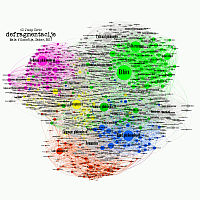 download | table of content | heretical postscript
download | table of content | heretical postscript
foreword
foreword
The book is, as the title goes, defragmentation - preventive editing of the hard disk from scattered data, coalescing bits and pieces, as well as notes for the papers I planned to write when I catch a bit more time. This mystical temporal dimension, as it usually does, did not become reachable until the deadlines showed up. Truth before Plato, as it should be in this profession.
The book is divided into three parts. The first is made up of two short studies on popular culture - the Slovenian rock group Buldožer and the importance of disobedience in morality, as well as video games and the moral panic that has been increasingly associated with them lately.

Fig.1 The author with 1975 people's choice tobacco
The second part contains a contribution to the relationship between philosophy and disability studies. It proposes a new approach to the conceptualization of disability through the continuum of the heroic narrative. This, along with philosophical analysis, offers support from empirical research. The topic of disability is not only a professional choice, it is also my life narrative - due to complications during childbirth, I earned Erb's palsy, twenty years of rehab, and a topic worth of professional deformation.
The third part is the analysis of social networks in the history of philosophy, as it was first shown by sociologist Randall Collins. The analysis is extended to the
If the research results are any valid, I expect the philosophical purists to be insulted about the inadequacy employing statistics in philosophy, the superficiality of the bibliometric analysis, extensive reliance on sociology, and containing far too little philosophy. Interdisciplinarity is a unifying subject here. I believe if philosophy does not accept the extended hand from other disciplines, her future is going to be certain and short. They will simply take from the philosophy all that is useful to them, and the history of philosophy will again be the history of renouncing its applicability. Like in some of Grimm's fairy tales, once proud and fertile parent (we philosophers like to praise our profession as the queen of sciences) will turn into a empty shell of envy. The change is in a certain way a form of dying, shedding of the skin we have grown off. The anxiety that follows is quite understandable.
What is philosophical content of the book? I understand philosophy as conceptual engineering and any essentialist approach is alien to me. The philosopher's job would be to analyze the meta-levels of a certain area. When I write about popular culture, then it is about presenting the significance of disobedience as a positive dimension of morality versus the traditional consideration of obedience as a desirable feature. Buldožer is a case study in how anarchistic aesthetics becomes a desirable ethics. Research from social psychology serves as a selective mechanism for choosing the conceptual framework that is not only logically consistent but empirically supported. Poincairé and Popper warn us we may have infinite number of theories to describe the finite number of facts and we need to consider meta-frames to establish and justify a certain scientific explanation.
In disability studies, the paradigm problem is not only epistemological but ethical also. Describing disability as a moral state, or medical one, as a part of minority policies or as social model, either as a cultural or relational construction largely determines not only what makes disability specific, but also what kind of moral attitude towards persons with disabilities we hold. Is it positive discrimination, fairness, stigmatization or (un)existence of social obligations towards persons with disabilities. The moral aspect is also perceived from the perspective of the Croatian society. As its citizen and the disabled persons I see our part of social reality not (unfortunately we are too often faced with such a complaint), as just another group seeking its part of the budget, but as a group that has a resource that, the society has abandoned - the awareness of its own limitations and the necessity of investing efforts in order to compensate for the backlog. We have the awareness of that such process developes in small steps and the destination may be out of the reach. The second choice is despair, which is not a desirable option. If this is not a worldview worth of philosophical investigation, then I do not know what is.
The part on the metaphilosophy is the easiest to defend, and is probably the most endangering to the purists - how appropriate is to do empirical research about What is philosophy? and What do philosophers do? I start with a reasonable assumption that knowledge organized in encyclopedias is representative, especially for the discipline that goes back to history over the 26 centuries. The analysis of complex network of links between encyclopaedic articles in the Routledge Encyclopedia of Philosophy shows several interesting outcomes: there is a clear complexity pattern, whether it be philosophers or concepts articles, and it is manifested through the power law. The parallel structure also exists in the network of philosophical knowledge, which points to the need to incorporate sociological discourse when we talk about the history of philosophy which is the core part of the curriculum. After all, mathematical logic is the mandatory undergraduate course for philosophy freshmen, and no one argues it's misappropriate. The emergence of complex network analysis is a matter of intensity, not qualitative change.
* * *
This book never would look the light of the day without the patience, contribution and enormous support of Bruno Ćurko, Krešimir Zauder and Maja Jadrešin. I'm especially debted by review work of Franjo Pehar and Dario Škarica. Their encouragement on good parts, and warning about not so good ones is priceless. All errors are mine responsibility only.
* * *
Note on the scientific notation: I have consulted several manuals on different citation systems (APA 2010, Ellis 1998, Hacker & Sommer 2013, Lipson 2006, Lunsford 2010, UC 2010). As the list of sources refers to diverse media (printed and electronic monographs, periodicals, films, music, comics, network sites), the Chicago University Press (UC 2010) in the 16th edition proved to be the most applicable. I have decided to use the author-date system in-line rather than footnote one for various reasons: it distracts reader less, it's more economic, it's both alphabetical and chronological, and it covers better various media used. The Zotero software (CHNM 2016) was used to record the references.

